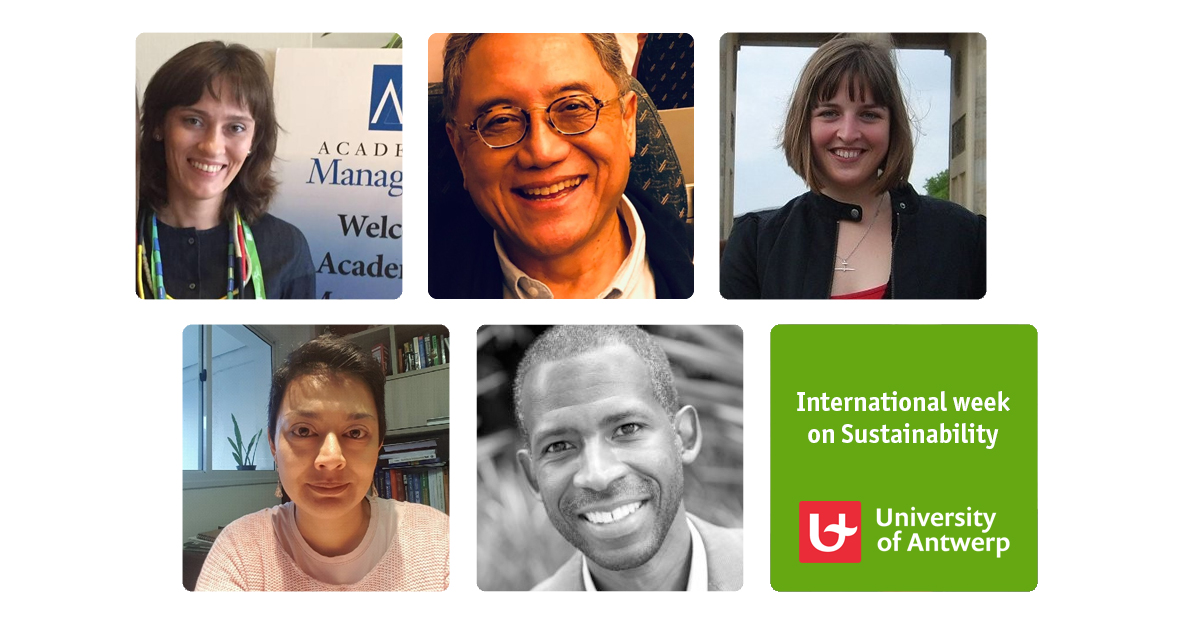For the 8th time in a row, the Faculty of Business and Economics organised its I-week on Sustainability for business economics students. Due to the COVID-19 pandemic, this year’s edition will take place online. But as a famous soccer player once said, each disadvantage has its advantage…
The objective of the I-week is to
-
-
- foster a global perspective and intercultural climate;
- expose students to international perspectives on current sustainability issues for companies;
- reflect on ethical issues in the business world through a multidisciplinary approach;
-
The first online edition has become one of the most international editions so far, with speakers and students coming from 24 different nationalities and 4 different continents. Throughout the week, they work together in multicultural groups on a sustainability topic. We are happy to share some of the main takeaways of the plenary sessions given by academic international speakers.
“Start with the man in the mirror”
 Pri Notowidigdo (Indonesia) shared his 45 years of global experience on achieving sustainability through global collaboration. He focused on the why, the challenges and their solutions. Effective global collaboration requires defining goals, addressing employee concerns, adapting business processes and creating partner relationships. Open communication is critical to create an environment of trust. In effective collaboration we also need respect, willingness and empowerment.
Pri Notowidigdo (Indonesia) shared his 45 years of global experience on achieving sustainability through global collaboration. He focused on the why, the challenges and their solutions. Effective global collaboration requires defining goals, addressing employee concerns, adapting business processes and creating partner relationships. Open communication is critical to create an environment of trust. In effective collaboration we also need respect, willingness and empowerment.
Key takeaways
-
-
- Knowing and embracing your core values with integrity and courage will shape your decisions because values drive behaviour.
- Respect, humility, and understanding the value of diversity
- Communication is paramount
- Practice high touch as well as high tech
- Embrace inner resilience, adaptability, and prediction
-
“Green initiatives are no burden but a new opportunity”
 Orsolya Diófási-Kovács (Hungary) presented an overview of sustainability solutions in supply networks through the Green Supply Chain Management framework. Each element of the framework was introduced along with environmental management solutions that support circularity and carbon neutrality efforts.
Orsolya Diófási-Kovács (Hungary) presented an overview of sustainability solutions in supply networks through the Green Supply Chain Management framework. Each element of the framework was introduced along with environmental management solutions that support circularity and carbon neutrality efforts.
Key takeaways
-
-
- To green a supply chain, you need commitment among all partners, in order to align the environmental goals and set common targets.
- The product and operations can also be green. Third party certification is very important for transparency and trust.
- The requirement of the customer for green logistics services is vital in order to move the LSP market toward greener operations
- Reverse logistics can create the most value if the product is designed to reuse recycling
- Every member of a supply chain is a buyer! Every organization does procurement, so make it greener by using ecolabels and environmental management systems to seek out green products and services
- Last but not least, we have to look at performance measures to really know if we made the change. We have to measure and manage what we care about.
-
“At the thriving phase of sustainability, the company is concerned about helping to solve social problems”
 Kavita Hamza (Brazil) shared her research experience on responsible innovation and transformation in B2C companies. Responsible transformation corresponds to the process of changing firms’ capabilities in order to perform more systematically responsible innovations.
Kavita Hamza (Brazil) shared her research experience on responsible innovation and transformation in B2C companies. Responsible transformation corresponds to the process of changing firms’ capabilities in order to perform more systematically responsible innovations.
B2C companies from different countries are changing their way of developing new products, and how it affects the different departments and the corporate culture. Different configurations are being tested by different companies, in order to perform responsible transformations and consequently responsible innovations, which were classified as “seeding”, “growing”, “maturing” and “thriving”.
Key takeaways
In this session, Kavita analysed how B2C companies from different countries are changing their way of developing new products, and how it affects the different departments and the corporate culture. Both Kavita and the students shared numerous examples from around the world: From a clean water initiative in Brazil to vertical farms in India.
“find your stone and discover your sculpture out of it”
 Ekaterina Ivanova (Russia) gave students practical advices and life-hacks on how to make their sustainability poster appealing to the audience.
Ekaterina Ivanova (Russia) gave students practical advices and life-hacks on how to make their sustainability poster appealing to the audience.
Key takeaways
-
-
- Be fully present at the moment of creation.
- Find your style as an artist. Connect your head with your hearts and hands.
- Find what inspires you: nature, people, music, urban life, home.
- Resources on earth are limited, but human creativity is not.
- A good visualisation = information + story + goal + visual form.
- Go from an idea to visualisation, then remove unnecessary things and add accents. Mind the power of simplicity.
-
More to come
 Ian O. Williamson (Dean of The Paul Merage School of Business, University of California, Irvine – USA) will share his ideas on how firms and organizations deal with social injustice in their communities and how organizations can take advantage by embracing social sustainability and become more competitive in the process. Organizations who focus on developing good relationships with relevant stakeholders usually gain respect, trust and loyalty. Acknowledging that the organization is embedded in a community and also sharing value with this community almost always creates trust and (in)direct advantages for the firm. Such engaged firm almost always gains reciprocal trust from such a genuine social (community) partner.
Ian O. Williamson (Dean of The Paul Merage School of Business, University of California, Irvine – USA) will share his ideas on how firms and organizations deal with social injustice in their communities and how organizations can take advantage by embracing social sustainability and become more competitive in the process. Organizations who focus on developing good relationships with relevant stakeholders usually gain respect, trust and loyalty. Acknowledging that the organization is embedded in a community and also sharing value with this community almost always creates trust and (in)direct advantages for the firm. Such engaged firm almost always gains reciprocal trust from such a genuine social (community) partner.
-
-
- More about the I-week on Sustainability on the UAntwerp website.
- Interested in collaborating with us and our students during I-week? Contact iweek@uantwerp.be
-


